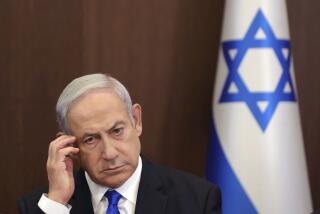Doctors Delay Yeltsin Surgery at Least 6 Weeks
- Share via
MOSCOW — Surgery for Russian President Boris N. Yeltsin will be postponed for at least six weeks because his heart muscle is damaged, and he will probably need another two months after a triple or quadruple bypass operation to recuperate, his doctors said Wednesday.
The announcement by Russian surgeons and Dr. Michael DeBakey, the American heart bypass pioneer who is here consulting on the case, was aimed at dispelling fears that Yeltsin, 65, who has been hospitalized for almost two weeks, is too weak to undergo surgery at all.
But it threatened to leave Moscow without an active leader for most of the winter and prompted even more moves by the president’s potential successors to draw attention to themselves.
The medical luminaries, who met for three hours of consultations at the Central Clinical Hospital, were determinedly upbeat about the delay in the president’s planned surgical procedures. They said Yeltsin’s condition had improved since a heart attack during the summer--a seizure unreported at the time--and the delay was needed to ensure success.
“If we were to conduct the operation today, we could expect a positive result. The chances of the positive result would be about 80%. But if we give the patient another six weeks to prepare for the operation, the chances of success will be close to 100%,” said Dr. Renat Akchurin, the Russian surgeon who is expected to operate on Yeltsin, with DeBakey watching.
The doctors want to keep Yeltsin hospitalized for six to 10 weeks before surgery. But DeBakey said the president is mentally fit and could “function in that capacity as if he were in the Kremlin.”
DeBakey said that Yeltsin, in addition to experiencing heart muscle damage, had been losing blood in recent months and he added that the cause needed to be investigated. “It is an easily correctable thing, but we have to be sure,” he said, adding that the Russian leader’s kidneys and liver are functioning normally.
DeBakey--who performed the first heart bypass 32 years ago and was asked by President Clinton to offer his services to Yeltsin--said it is “very possible” that Yeltsin will function normally six weeks to two months after the operation.
Yeltsin appeared on television Wednesday, welcoming DeBakey to the Central Clinical Hospital. Dressed in a V-necked sweater, Yeltsin smiled and spoke clearly if slowly--the first time in weeks of carefully edited shots of him with visiting officials that his voice has been broadcast. Akchurin said Yeltsin took the doctors’ advice “courageously and calmly.”
But one Western participant at a three-day conference on heart surgery, being held in Moscow at the same time as consultations on the president’s condition, said Russia’s top doctors were confident about the state of their country’s heart surgery but seemed concerned about doing even the most basic operation on Yeltsin’s heart. He suggested that the optimism expressed by Yeltsin’s doctors about his impending surgery was motivated partly by politics; he implied, instead, that no procedure will ever be performed.
Confusion about Yeltsin’s health and whereabouts has dogged Russia since late June, when he retreated from public life several days before a presidential runoff election. He still beat Communist rival Gennady A. Zyuganov on July 3.
Akchurin last weekend became the first insider to confirm widespread popular suspicion that Yeltsin’s prolonged absence had been caused by a heart attack this summer, after two bouts of illness last year. The disclosure was an embarrassment to the Kremlin, which had repeatedly covered up the president’s bad health. Yeltsin announced Sept. 5 that he planned to undergo bypass surgery by the end of the month.
But the drawn-out timetable announced on Wednesday would schedule the operation between early November and early December--and DeBakey left open the possibility of more postponements by saying the timing depended on what the medical team observed in the next six weeks.
Kremlin officials have no political option now but to continue to insist that Yeltsin will soon be fit enough to undergo surgery. Any suggestion that he is too ill for an operation would intensify a struggle between his would-be successors and threaten Russia’s post-election stability.
Presidential hopefuls have used growing public anxiety about Yeltsin’s future--and the prospect of Russia drifting back into the chaos of its recent past--to seek the spotlight for themselves with demands for Yeltsin’s resignation or apocalyptic warnings about disasters facing Russia.
Zyuganov has claimed that Yeltsin deceived voters about his health and was reelected under false pretense. On Tuesday, he demanded Yeltsin’s resignation.
On Wednesday, Security Council chief Alexander I. Lebed also took his turn, asserting that Russia’s underpaid armed forces were on the verge of revolt. The outspoken former general, who answers directly to Yeltsin, also criticized U.S. missile attacks on Iraq.
The Clinton administration responded quickly, accusing Lebed of undermining U.S.-Russian relations. “Frankly, we are puzzled with the comments of Mr. Lebed because they are so inconsistent with the generally good cooperation we have had with the Russian government,” State Department spokesman Nicholas Burns said.
Under Russia’s vaguely worded constitution, Chernomyrdin becomes the caretaker leader of the country for three months if the president dies. New presidential elections would then be held.
Times staff writer Norman Kempster in New York contributed to this report.
More to Read
Sign up for Essential California
The most important California stories and recommendations in your inbox every morning.
You may occasionally receive promotional content from the Los Angeles Times.













